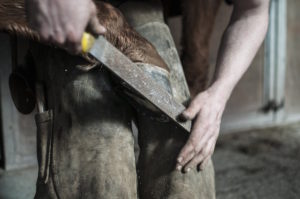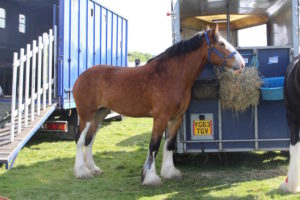VIEW OUR COMMERCIAL
As seen on TV

CHOOSE THE EASY OPTION FOR YOUR INSURANCE, WE’LL GET YOU A QUOTE IN NO TIME AT ALL.
Posts for:
Whether you’re taking your horse to the vet or a show, you’ll need a horsebox to get there. You can choose between towing a trailer behind your vehicle or buying a motorised horsebox. Depending on what you have, you’ll discover various regulations apply regarding licences and insurance. With different rules depending on the weight and type of your vehicle and when you passed your driving test, it can seem complicated. Use our guide to find out everything you need to know; from what driving licence you need to if you need horsebox insurance.
Is horsebox insurance required by law? Towing a horsebox behind a vehicle
If you tow a horsebox behind your car or van, you don’t have to have separate horsebox insurance by law. You do have to have valid insurance for the towing vehicle though. Also, be aware that you are normally only covered third party for trailers with your standard vehicle insurance. That means that if you have an accident, the other party’s costs will be covered. However, you will not receive any payment if your horsebox, or the kit inside, is damaged or written off.
For more peace of mind, you need dedicated, fully comprehensive horsebox insurance. This can be tailored to your specific needs to include valuables transported inside the box, such as tack or clothing, as well as covering the trailer itself. Cover for driving in Europe can also be included.
- Bear in mind that your horse is not covered whilst it is travelling under horsebox insurance. For that, you’ll need separate equine insurance.
- Double-check your policy to see if you are covered when driving off-road, for example on a showground. It’s also worth checking if tack and other contents are covered against theft when you’re parked at a show.
Is horsebox insurance required by law? Driving a motorised horsebox
If you drive a motorised horsebox, for example, a vehicle that has the horse or living quarters immediately behind the cab, you need specialist vehicle insurance. If you don’t have the right cover for the size and weight of horsebox, you will be breaking the law. You can be fined and receive penalty points on your driving licence.
- Remember, your horsebox must be insured even if you don’t intend to drive it and it is just parked by your stable. The only time you don’t need insurance is if the horsebox has been registered as off the road (SORN).
- You must hold a minimum of third party insurance for your motorised horsebox. Remember, this only covers the other party if there is an accident. Choose third party fire and theft if you want to be compensated if your horsebox is stolen or damaged by fire. If you want to be covered if your horsebox is damaged in an accident as well, you’ll need to select comprehensive cover.
Is breakdown insurance worth it?
The thought of breaking down in our car is worrying enough. If you’ve got your precious horse at the back, it really can be a nightmare. With horsebox breakdown cover you can rest assured you can quickly call for help from professionals. If your car or box can’t be fixed at the roadside, you’ll have peace of mind you and your horse can be transported to somewhere safe. And you’ll know that there will be no unexpected bill to worry about.
Buying your breakdown cover with your horsebox insurance can mean bundle-deal savings. Speak to your broker to find out more.
Your other legal responsibilities when you tow a horsebox
It’s essential to find out if you can or cannot legally tow your horsebox. If you do accidentally tow a horsebox without the right type of driving licence, you will be breaking the law and your insurance will be invalid. That can leave you with fines and penalty points if you are caught. And if you are unlucky enough to have an accident, it will leave you hefty bills to pay.
Current legislation: driving licence requirements
The current legislation on what you can tow is based on when you passed your test and what you want to tow.
- If you passed your driving test before the 1st January 1997 then you can drive a vehicle and trailer combination with a combined weight of up to 8.25 tonnes. Your driver’s licence will cover this, without any need for a special operator’s licence.
- If you passed your test on or after 1st January 1997, you can drive a vehicle with a weight of up to 3500kg and attach a trailer of up to 750kg, without a special licence provision. You can tow a trailer over 750kg as long as your vehicle and trailer combined do not weigh over 3,500kg.
However, if you are driving a combination that exceeds those weight limits, you are required to apply for a Category B + E entitlement. This will mean you have to take an additional driving test.
What is an operator’s licence and do I need one?
If you are only transporting your horse as part of your hobby, you will not need a special operator licence. Be aware that you may need an operator’s licence if your activity could be considered part of a business.
For example:
- If you are transporting horses for reward, you’ll need an operator’s licence. For example, you are taking someone else’s horses to a show and they are paying you for the service. You’ll need an operator’s licence even if it is just for one day.
- If your equestrian activity is more than a hobby. For example, if prize money and sponsorship means your income from equestrian activities is higher than your outgoings.
It’s useful to remember that if you pull your trailer using a ‘dual-purpose’ vehicle, such as a 4×4 that can carry goods and passengers, then this is exempt from operator licensing.
Sticking to the speed limits with your horsebox
If you break the speed limit in your horsebox, you could face fines and penalty points on your licence. Here’s what you need to know:
- If you are towing a horsebox behind a vehicle with a combined weight up to 7.5 tonnes the speed limit on single carriageways is 50mph, on dual carriageways is 60mph and on motorways is 60mph.
- When you are driving a horsebox with no trailer up to 7.5 tonnes, the speed limit on single carriageways is 50mph, on dual carriageways is 60mph and on motorways is 70mph.
- If you are driving a horsebox over 7.5 tonnes with or without a trailer, the speed limit on single carriageways is 40mph, on dual carriageways is 50mph and on motorways is 60mph.
Buy cheap horsebox insurance for peace of mind
It’s Easy2 find the right horsebox insurance at the best price at Easy2Insure. Call our helpful team on 0800 917 9522 or get a free quote.
This article was first published in April 2015. It has since been completely updated to give you the latest and best information.
We love our phones. In fact, we love them so much that we’re glued to them almost 24/7. They’re on our bedside tables when we wake up, and they’re a constant companion no matter where we go. Our love affair with top tech seems to know no bounds, which is why we invest so much time, and money, into them.
And we’re talking a lot of money here! Top of the range Apple or Samsung Galaxy phones can easily cost you anything from £700-£1000 – that’s a huge financial investment on a single piece of equipment. That’s why mobile phone insurance is such a smart idea.
Most people take the quick option and buy mobile or smartphone insurance from their phone supplier or network provider (if the phone is part of the package). However, that isn’t always the best option. Buying your insurance from your phone provider can mean that you’re paying far more than you need to, and not getting the cover you might actually think you’re paying for.
As with all mobile phone contracts, insurance provided by networks often have provisos tucked away in the small print. That means they won’t pay out if your phone is stolen, lost or damaged, even if the headline print says they will. So before you sign on the dotted line ‘because it’s easier’, take a few minutes to hop online and hunt around for mobile phone insurance that will give you the cover you want.
Why buy mobile phone insurance?
If you buy a new bicycle that costs a thousand pounds, or a top of the range laptop, you want to protect that investment with some insurance. It’s logical, then, that you’d do the same for a mobile phone. In fact, it’s more important to have insurance because your phone doesn’t spend half its time locked away in your home or garage. It’s in your pocket or bag wherever you go, and so it’s at much greater risk of being lost, damaged or stolen.
Having mobile phone insurance gives you the peace of mind that if your expensive iPhone does fall out of your pocket while you’re out and about, or is stolen from your bag, you’ll have the right kind of insurance to cover the cost of replacing it.
Why not just insure it under your household cover?
Modern house and content insurance policies also include a certain level of cover for personal belongings that you carry on you or have in the car. This can include things like mobile phones, but what you do need to consider is that many of these types of policies will not cover a single item if it’s above a certain value. That excludes many top-end mobile phones which cost much more than the single-item upper limit of the policy.
It can also be difficult to make a claim, especially if the insurance company thinks you may have been partly responsible for the loss or damage through negligence (for example, putting your phone on the table in a restaurant and forgetting to pick it up before you leave). Proving otherwise can be extremely difficult.
Why not just take up the phone network’s insurance offer?
It can be all too easy to simply tick the insurance box on your mobile phone contract when you sign up, without thinking about what exactly you’re buying. You may also find that, because they feel they have a ‘captive audience’ mobile phone networks can charge higher premiums than other insurance providers for mobile phone cover. It’s easy to miss exactly how much you’re paying, too, as the amount is often toggled onto your monthly tariff. Such a small additional fee is easy to overlook, but what you need to do is work out exactly how much you’re paying over the course of a year, and just what kind of cover your policy gives you. It may be much less than you originally thought…
Are you really getting a like-for-like replacement?
You may benefit from a next-day replacement if your phone is lost or stolen, but remember that you may be limited to the models your provider has, and it may not be a like-for-like replacement. So all those high-end accessories may not even be compatible with the replacement phone they give you!
There may also be big caveats as to what type of phone is covered. So you’ll only be covered for the phone that your network gave you as part of the contract. If you decide to upgrade with a SIM-free phone then your insurance policy won’t cover that phone.
Why buy extra mobile phone insurance?
Mobile phone insurance doesn’t just cover the loss or damage of the phone itself. One of the big problems people have, especially if their phone is stolen, is the costs of unauthorised calls. The network will charge the bill-payer or contract holder for any calls put through the phone, including those that a thief may make. Dedicated phone insurance includes cover for the cost of unauthorised calls and digital downloads, fou even more peace of mind.
I’ve got cover on my household contents insurance…
While mobile phone cover can be specified as part of your home contents insurance, there are, once again, caveats that could cause a problem if you make a claim. Not only do household insurance policies often leave out accidental damage as part of your phone cover, but if you do make a claim then it may push the cost of your house content insurance policy up next year.
What do the experts recommend?
At Easy2Insure, we know how difficult it can be to get the right kind of cover for such an important personal item. So we’ve done the research for you to find independent mobile phone insurance that’s both affordable and comprehensive.
Because our brokers have experience of finding specialist cover for mobile phones, they can source the best deals and the best prices for wide-ranging insurance cover that is separate from your home contents cover or any insurance that your network provider may offer. It can be tailored to suit your needs, making it a viable and often much cheaper way of protecting your phone.
We always advise being cautious when you’re out and about, as it’s all too easy to lose such a small item as a phone. But if the worst does happen and your phone is lost, stolen, or damaged, mobile phone insurance certainly helps to soften the blow!














